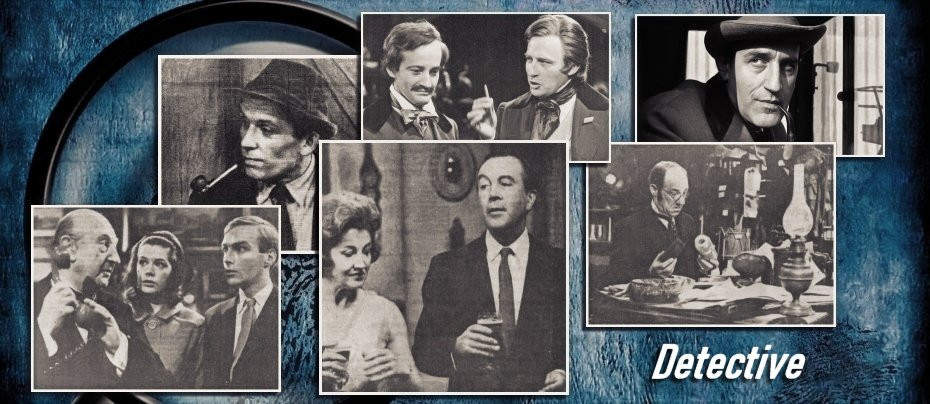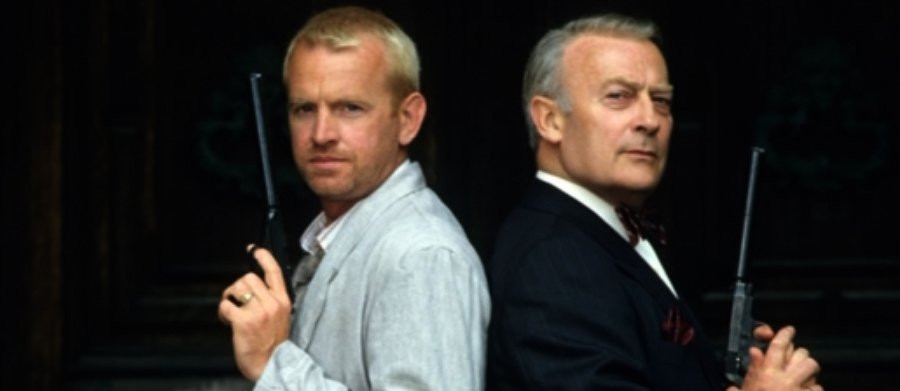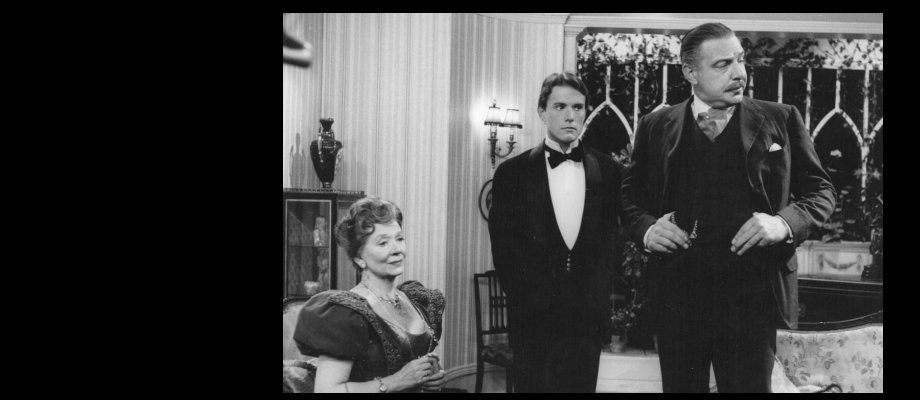
Edward Woodward
Edward (Albert Arthur) Woodward, one of Britain's most celebrated actors, known for his versatility, range, and incomparable ability to play introspective men of conscience throughout his illustrious career, captivated audiences both on the small and large screen, leaving an indelible mark on the world of acting. From his early days as a stage performer to his portrayal of iconic television characters such as the unwilling government assassin David Callan or champion of the underdog Robert McCall, Woodward’s talent, dedication, and passion for his craft shone brightly, cementing him as a true legend in the entertainment industry.
Born on 1 June 1930, in Croydon, Surrey, the only child of parents Edward Oliver Woodward, a factory worker, and Violet Edith Woodward, young Edward, at the age of five, made his stage debut in a talent contest performing a little ditty taught to him by his grandparents. He won first prize – a penknife, which he treasured until he noticed the silver wearing off it. But his early life was, like so many of his generation, fraught with danger as German planes blitzed many urban areas. By the time he was 13 years old, his family had been bombed out of three properties.
He attended three different schools and at one of them, was encouraged by one of his teachers to perform drama. After leaving school at the age of 14, Woodward wanted to train as a journalist and took work in a sanitary engineer's office as a typist and attended Kingston Day Commercial School. Then, at the age of 16, he won a scholarship to study at the Royal Academy of Dramatic Art, where he was one of the youngest students ever accepted at the prestigious institution for aspiring actors. During the holidays he would perform in Rep and gained stage experience up and down the country earning around £7 a week. But as most actors will tell you, this is not the life you choose if you want regular employment and there were many times when he had to rely on dole money to live on. “I used to go to Chiswick (dole office) with Frank Finlay, who was also out of work, to pick up our cheques, then we’d slink off to the nearest café and drown our sorrows in black coffee” he later remembered.

It probably wasn’t the ideal time to take on extra responsibilities, but in 1952, Woodward did just that. He married Venetia Barrett on 30 July 1952 and by April the following year their first son, Timothy was born. His second son, Peter arrived in 1956. By that time, Woodward had made his big screen debut in the low-budget British comedy Where There’s a Will, which starred Leslie Dwyer (Hi-de-Hi!), Kathleen Harrison (Mrs Thursday), Dandy Nichols (Till Death Us Do Part) and George Cole (Minder). There followed a number of television appearances but by 1962 he fell into a depression after he hadn’t worked for around six or seven months. Then he was offered the starring role in the stage production of Rattle of a Simple Man, a comedy-drama that explores the relationship between a shy and inexperienced man and a worldly and confident woman. But that soon became beset with problems. After opening in Richmond it was decided to take the play to London’s West End, but at that time there wasn’t a theatre that hadn’t been booked up for a year in advance. With the play now on hold, Woodward’s depression got worse.
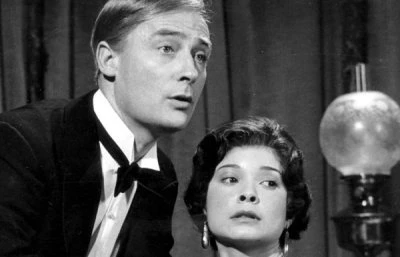
His wife suggested something to him as a way of picking him out of his melancholia. With the little funds they had saved up, she suggested they buy a boat. He found an old and worn cabin cruiser that was being sold for £60 and made a deal with the seller to put £5 down and pay the rest in instalments. Within a few weeks of the purchase, an offer came in to take Rattle to South Africa – Woodward was not only to star in it but direct it as well. The pay was £120 per week. By the time he had finished abroad, the play was ready to go into the West End where it opened at the Garrick Theatre to rave notices. Woodward’s co-star, Shiela Hancock (The Rag Trade) won the Evening Standard Best Actress Award and Woodward took the production to America where it played on Broadway. When he'd done with it, he was offered more Broadway roles and starred in the musical comedy High Spirits, which won three Tony Awards, followed by the 1966 comedy The Best Laid Plans.

By this time, Woodward was becoming more and more noticed on television, accepting every role that was offered to him. He appeared opposite Judi Dench in Major Barbara, and did single episodes of Emergency-Ward 10, Sir Francis Drake, Sergeant Cork, Dixon of Dock Green and The Saint among many others. It was shortly after the latter that he was cast as David Callan in ABC’s Armchair Theatre production of A Magnum for Schneider. But he very nearly didn’t do it.
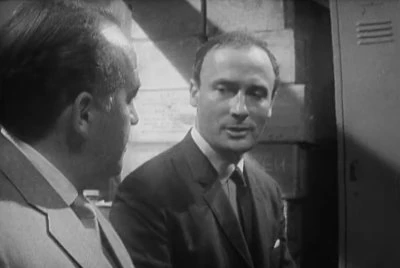
“I’d been working very hard and done quite a bit of television,” he said in an interview many years later. “I wanted to go on holiday, and it would be the first one with my family for years. We’d booked it, then, four days before we were due to go, there was a script put through the letterbox. They did it on the assumption that an actor can never resist reading a script. I read it knowing I couldn’t put it off for the three weeks I’d be away. It was obvious that it had been offered to someone else. If you’re asked late then you know it’s been offered to someone else first. I knew there and then I had to do it. I had to tell the wife that we couldn’t go on holiday. The children cried a lot, but I knew I had to do it.”
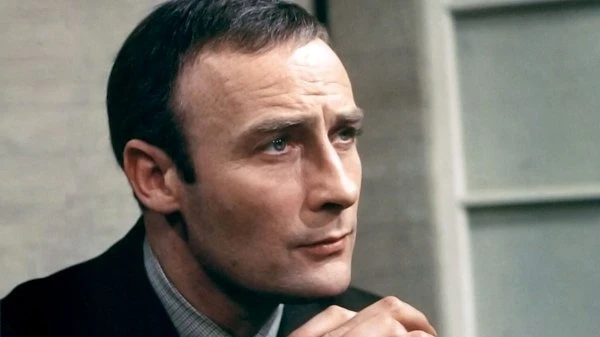
Magnum was quickly transformed into the espionage series Callan, showcasing Woodward’s adeptness at portraying controlled anger, which was a vital part of the character. His performance garnered immense success from 1967 to 1972, leading to a film adaptation in 1974. He also shared the screen with Laurence Olivier in a 1978 rendition of Saturday, Sunday, Monday, for the Laurence Olivier Presents anthology series. While Callan may have somewhat defined his image, he continued to secure prominent roles in comparable productions, although none reached the same iconic status. In 1977, he headlined two seasons of the BBC2 dystopian drama 1990, depicting a Britain succumbing to dictatorship. Following this venture, he focused on stage and film projects throughout the late 1970s without reaching the same heights of fame as Callan until he assumed the lead role in The Equalizer (1985-89), an American television series centred around a former intelligence operative.
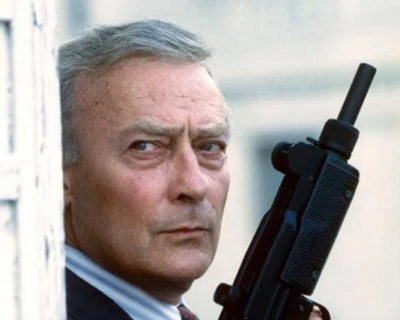
Woodward said he initially found the show's premise silly, but said a leading role on a major American television network was too great an opportunity to refuse. "Because of it," he noted wryly, "when I was 58, I was voted Sexiest Man in America -- ahead of Tom Selleck." It was compensation for ITV not being able to sell Callan to US television. The US market in the early 1970s was full of crime capers with gimmicks. Ironside was in a wheelchair, Longstreet was blind, McCloud was a cowboy out of his comfort zone in Manhattan, and McMillan and Wife were…well, husband and wife as the title implied. Or they were formulaically glitzy, like Starsky and Hutch or Hawaii Five-0 with lots of glamourous cars, glamourous women and glamourous backdrops lumped together with a working manual of stereotypical characters. Callan wasn’t any of those things and it was distinctly British. So, when The Equalizer hit the screens a decade later, it took all of those 70s cop-show tropes, which were still a huge part of American television and turned out the type of series that Callan might have been if it had been made in the USA.
During this period, Edward and Venetia’s marriage ended, although it had been on rocky ground for a number of years as he had been having a long-term affair which was widely reported in the British press. Once divorced, he married actress Michele Dotrice who had previously played the long-suffering wife of Michael Crawford’s comic creation Frank Spencer in Some Mothers Do ‘Ave ‘Em. She was 18 years younger than Woodward. As he embarked on his new marriage and his new-found fame, earning more money than he had ever earned in his life, things were looking pretty good for him.
But there was a price to pay for this success.
In the course of a taxing production schedule, Woodward smoked upward of 100 cigarettes a day and gained more than 40 pounds in weight while subsisting largely on junk food. After filming a few episodes of the third season, and upon returning to England to make a miniseries titled Codename Kyril, he suffered a heart attack. He was rushed to Warwick Hospital where he was treated. But within a month he suffered a second coronary.
CBS in America drafted in a number of heavyweight stars to keep The Equalizer going whilst Woodward convalesced. Stars like Robert Mitchum and Telly Savalas stood in as Woodward stopped smoking, gave up junk food and alcohol and began a fitness regime until he was fit enough to return to work. He continued on the series until 1989. The Woodwards returned to the UK to settle, but CBS, keen to cash in on his popularity, offered him a new detective series titled Over My Dead Body. Initially, he turned it down, but around the same time he was hit by HMRC with a massive tax bill from his earnings in America. An explanation that he had already paid the tax on this in America fell on deaf ears. HMRC insisted on him paying, which all but wiped out the million-plus dollars he had earned from The Equalizer. Reluctantly, he headed back to Hollywood.
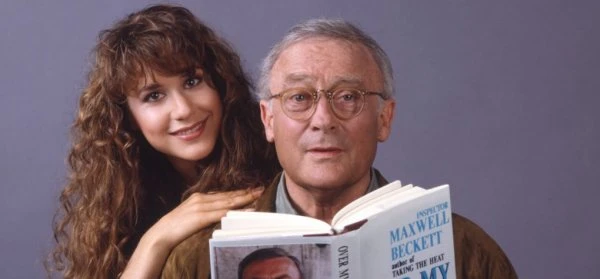
Over My Dead Body was not the success that CBS had hoped for and as is common on American networks, if something is not clicking with the audience - it has no future. And no future means pulling the plug as quickly as possible, even if the series is halfway through its season. As a matter of fact, Over My Dead Body was filming the last of twelve episodes when the head of CBS called Woodward on the phone and ordered him to stop the cameras from rolling with immediate effect. Woodward was incensed. A furious row broke out as Woodward pleaded that it made no sense to stop filming halfway through the last episode. He was at least granted the privilege of completing the filming. But the incident soured his relationship with CBS. He was contractually obliged to make one more made-for-tv movie co-production with CBS and Yorkshire Television. The movie, Hands of a Murderer, a Sherlock Holmes tale in which he starred as the great detective, received a decidedly lukewarm reception. Edward Woodward headed back home to England.
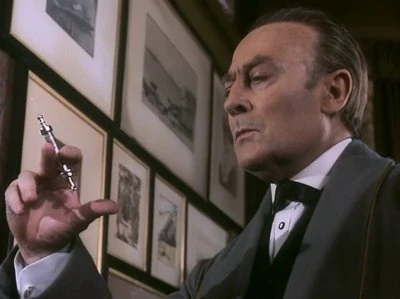
In 1991, Woodward began filming In Suspicious Circumstances for Granada Television. The series was a dramatized mix of fascinating real-life murder cases, some well-known, others obscure. Woodward appeared as the Storyteller, introducing each episode while guest stars such as Sue Johnston (The Royle Family), Helen Baxendale (Cold Feet, Friends), Philip Glenister (Life on Mars, Ashes to Ashes), Larry Lamb (Gavin and Stacey) and Amanda Holden (Kiss Me Kate, Cutting It) played principal characters. In 1994, Woodward took on a role that was as far removed from the suave and sophisticated Robert McCall character in The Equalizer as it was possible to be. The BBC series Common as Muck saw him cast as binman Mancunian Nev, the head of a crew of dustmen who are facing privatisation. The series was set very much in the mould of Auf Wiedersehen Pet, a comedy with a biting dramatic edge. Woodwards’ co-stars in the series were all familiar faces on British television and included Roy Hudd, Saed Jaffrey (both of whom appeared in Coronation Street), Michelle Holmes (Goodnight Sweetheart), Kathy Burke (Gimme Gimme Gimme), Lesley Sharp (Scott & Bailey), Paul Shane (Hi-de-Hi!), Terence Rigby (The Beiderbecke Affair) Tim Healy (Benidorm) and June Whitfield (Terry and June, Absolutely Fabulous).

In 1998, Woodward signed up to play Harry Malone, the man who barked orders and gave assignments to the men of CI5 in a revamp of The Professionals. CI5: The New Professionals was an independent production which failed to find a mainstream terrestrial broadcaster in the UK. Eventually, it was taken by Sky but only on the assurance that a number of sequences deemed "excessively violent or disturbing" were removed from the final edit of each episode. Only thirteen episodes were made before it was dropped. The series, in its original, uncut form, was eventually released on DVD in 2016. Sadly, it was the last long-run series that Edward Woodward appeared in.
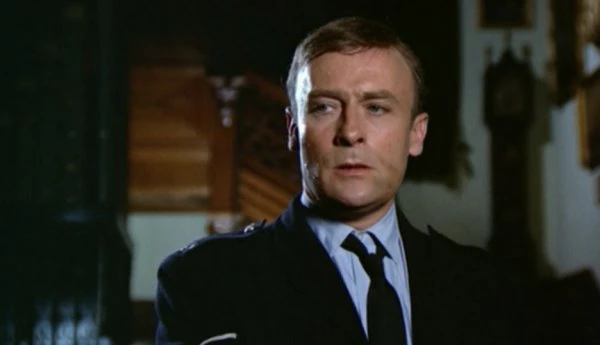
In 2007, Woodward made a cameo appearance in the movie Hot Fuzz. Edgar Wright, who co-wrote and directed the movie, had watched Woodward in The Wicker Man when it was shown on television. The 1973 British folk horror film in which Woodward co-starred with Britt Ekland, Diane Cilento and Christopher Lee is something of a cult favourite. Inspired by David Pinner's 1967 novel Ritual, the plot centres on the visit of a police officer, Sgt. Neil Howie (Woodward) to a remote Scottish island in search of a missing girl. Decades after its release, the film still receives positive reviews from critics and is considered one of the best films of that year. This was, in part, the inspiration for Hot Fuzz, a comedy about two police officers investigating a series of mysterious and gruesome deaths in a West Country village. Woodward’s appearance in the movie led to an appearance in The Bill in 2008 in which he played an old-time East End gangster, and this, in turn, led to his last television appearance.
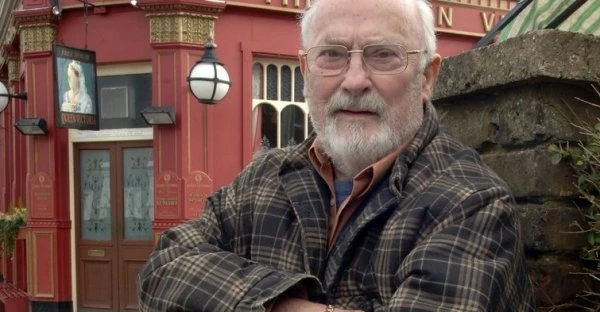
At 78 years of age Edward Woodward was cast in EastEnders as mild-mannered Tommy Clifford, a man who was supposedly researching a book about the 1958 Notting Hill race riots. He makes friends with Patrick Trueman (Rudolph Walker) whose fiancée died in a fire during the riots, but it transpires that it was Tommy who started that fire. Now dying, Tommy has sought out Patrick in order to beg his forgiveness. His role was for only six episodes, but the cast of the soap were full of praise for him. Rudolph Walker would later remember that Woodward was ‘easy going, very humble’ and a ‘gentleman and generous.’ He also recalled that Woodward ‘must have been very ill at the time but he didn’t make an issue about it so none of us even realised the huge effort he must have been making.’
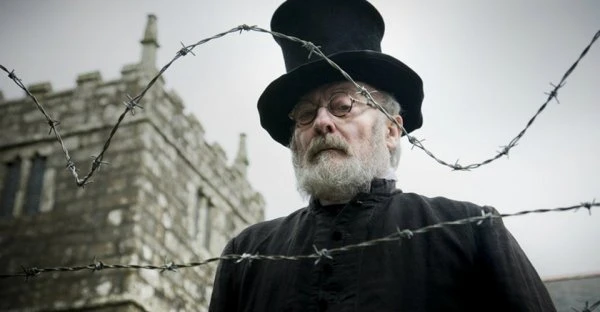
There was one more screen appearance to come from Edward Woodward. Although filmed before his EastEnders role, A Congregation of Ghosts was released after his last TV appearance. The film, steeped in Cornish folklore and history, was based on the true story of Reverend Densham, Rector of St. Bartholomew Church from 1931 until his death in 1953. He alienated himself from his parishioners to such an extent that he ended up preaching to an empty church. He was determined to rid the parish of whist drives, refused to conduct Sunday School, and disliked organ music. He took to locking overnight guests in their rooms lest they attack him as he slept. Furthermore, in a village full of farmers he advocated vegetarianism. Reviewing the movie, critic Chris McDonald found that it was 'a fitting endnote to a varied and memorable career, A Congregation of Ghosts largely negates its shortcomings by way of the strength of Woodward’s performance.' According to Woodward’s biographer Carolyn McGivern, ‘In many ways, Woodward saved the best till last, as all great stars should. He certainly poured every ounce of his being and charisma into playing Densham.’ Sadly, Edward Woodward passed away before the film was released and he never got to see the final cut.
On 16 November 2009, he succumbed to pneumonia at the Royal Cornwall Hospital in Truro. Tributes poured in from fans and colleagues. His co-star in Callan, Anthony Valentine said, “he could do anything with a broad spectrum. He could play cheeky chappy and he could play a professional assassin, and everything was utterly, totally believable.” His agent, Janet Glass said “I knew him a very long time and he was a superb human being. That integrity shone through in the roles he played. I can't ever remember, in all the productions he undertook, anyone having a bad word to say about him, and he never had anything bad to say about anyone else either."
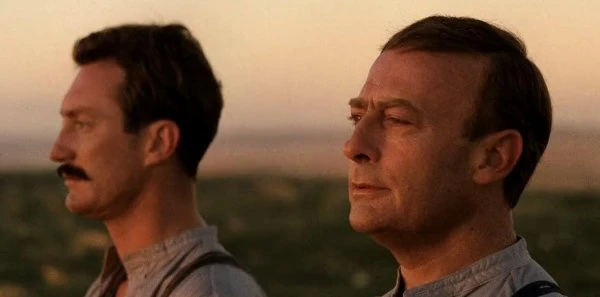
Woodward's embodiment of complex and morally conflicted characters endeared him to audiences and fellow actors alike. With his commanding presence, mellifluous voice, and ability to convey a wide range of emotions, he left an indelible mark on every role he played. His triumphs also included the 1980 movie Breaker Morant, about three Australian lieutenants during the Boer War who are court-martialled for executing prisoners as a way of deflecting attention from war crimes committed by their superior officers. His capability as a tenor enabled him to record 12 albums of romantic songs, as well as three albums of poetry and 14 books to tape. He was made an Officer of the Order of the British Empire (OBE) in 1978.
From his early days on the stage to his groundbreaking roles on the screen, Edward Woodward consistently captivated audiences with his immense talent and undeniable charisma. Through his dedication and commitment to his craft, he solidified his status as one of Britain's most revered actors. Woodward's legacy lives on in the hearts of those who were touched by his work and will continue to inspire generations to come. Of himself, he said, "I think I've probably done more television than any actor living. I've done over 2,000 television productions. I love television. To me, it's the most exciting medium. I think there is a strange immediacy to it. I suppose there is also the feeling that it is the largest medium by far for information, education and above all, entertainment. And after all, that's what an actor's life is all about. Getting work and entertaining people."
Published on November 4th, 2023. Written by Laurence Marcus for Television Heaven.



